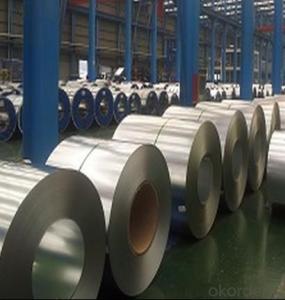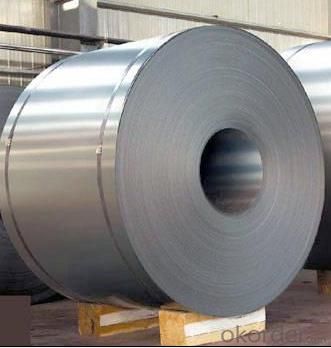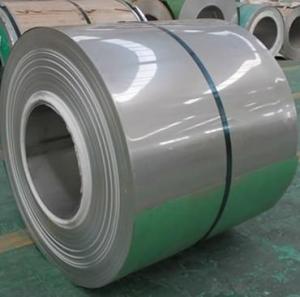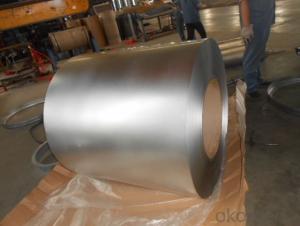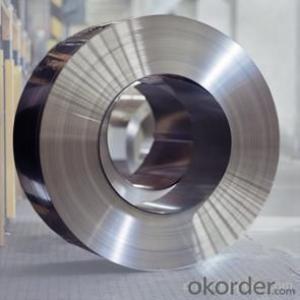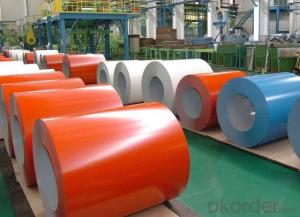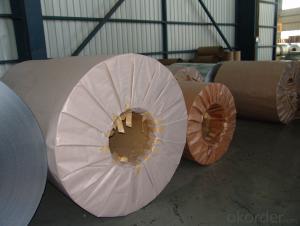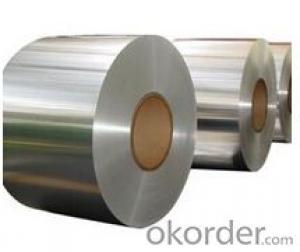Galvalume Steel Coils for Building material
- Loading Port:
- Shanghai
- Payment Terms:
- TT OR LC
- Min Order Qty:
- 25 m.t.
- Supply Capability:
- 10000 m.t./month
OKorder Service Pledge
OKorder Financial Service
You Might Also Like
| Standard: | AISI,ASTM,GB,JIS | Grade: | CGCC CGCH | Thickness: | 0.17-0.6mm |
| Place of Origin: | China (Mainland) | Brand Name: | Model Number: | GL-001 | |
| Type: | Steel Coil | Technique: | Cold Rolled | Surface Treatment: | Coated |
| Application: | Container Plate | Special Use: | High-strength Steel Plate | Width: | 750-1250mm |
| Length: | C | certificate: | SGS,BV,ISO | usage: | building roofing material |
| coil weight: | 3-7 ton | coil ID: | 508mm | base metal: | hot rolled steel coil |
Packaging & Delivery
| Packaging Detail: | mills standard export seaworthy packing or according to the customers' requirements |
| Delivery Detail: | 30days |
Galvalume Steel Coils/Coil
Product advantages:
A.high strength
B.strong soundess
C.well rainproof performance
D.continuous rolling
E.good corrosion resistance
F.easy to install and remove
Quality guarantee:
our company attaches importance to quality management and assurance,it is equipped with sound testing means and has passed the certification of ISO9001 Quality Management System and SGS,BV verification
Deiverse products
With world high-quality galvanized,aluminum and zinc coated and cold-rolled steel coils as base materials.
- Q: What is the (balanced) chemical equation for steel?
- Steel is about 5% carbon and about 89 % iron, the rest is impurities of all sorts That is considered low carbon steel There are precise formulas for other steels like High Speed Steel, High Tensile low carbon, and thousands of other steels. Specialty steels are a big business item with thousand of tons sold each year for specialty applications.
- Q: How are steel coils affected by global trade policies?
- Steel coils can be significantly affected by global trade policies. The imposition of tariffs or trade restrictions on steel imports can impact the availability and cost of steel coils in the international market. These policies can lead to increased prices, limited supply, and disrupted trade flows, ultimately affecting the steel coil industry worldwide. Conversely, the removal or reduction of trade barriers can foster a more open and competitive market, allowing for easier access to steel coils and potentially benefiting industries reliant on this material.
- Q: What are the different methods of testing steel coils for quality control?
- There are several methods of testing steel coils for quality control, including visual inspection, dimensional measurement, chemical analysis, mechanical testing, and non-destructive testing. Visual inspection involves examining the surface of the coil for any defects or imperfections. Dimensional measurement ensures that the coil meets the specified size and thickness requirements. Chemical analysis involves testing the composition of the steel to ensure it meets the required standards. Mechanical testing involves assessing the strength, hardness, and other mechanical properties of the steel. Non-destructive testing methods, such as ultrasound or magnetic particle inspection, are used to detect internal defects or flaws in the coil without damaging it.
- Q: I made a wood crossbow body but all I need is a bow which I want to be metal. I've used a thin steel sheet that I cut to appropriate size but when it bent with the string strung, it never went to original shape after being shot. I used a slightly thicker and it wouldn't bend at all. Anybody know what thickness and type to use? Any real answers are very appreciated. Thanks.
- You are trying to use plain carbon steel which only can be bent a little bit if it is to return to its original shape. You have to use spring steel or high carbon steel that is intended to be bent a lot and still recover to its original shape. Most people making crossbows with metal bows get a piece of steel from a leaf spring of a vehicle and grind it to shape. A steel bow cross bow almost always needs a very strong trigger mechanism and a miniature wench to pull the steel bow string into position. You might be better off making the bow of wood.
- Q: How are steel coils used in the manufacturing of industrial mixers?
- Steel coils are used in the manufacturing of industrial mixers as they are typically used to construct the main body and structural components of the mixer. The coils are formed into the desired shape and size, providing strength, durability, and stability to the mixer, allowing it to withstand the rigorous mixing processes involved in industrial applications.
- Q: How are steel coils used in the manufacturing of automotive accessories?
- Steel coils are used in the manufacturing of automotive accessories as they are processed and shaped into various components such as brackets, frames, and supports. These coils are typically cut, molded, and stamped into specific shapes before being assembled into the final product, adding strength and durability to the accessories.
- Q: what do they use to make stainless steel?and can stainless steel be melted again and again without losing it's Specifications
- This Site Might Help You. RE: What are the components of Stainless Steel? what do they use to make stainless steel? and can stainless steel be melted again and again without losing it's Specifications
- Q: How do steel coils differ in terms of size and weight?
- The size and weight of steel coils can vary greatly depending on their intended use and production process. When it comes to size, a steel coil is typically measured by its outer diameter, inner diameter, and width. The outer diameter refers to the total diameter of the coil, while the inner diameter refers to the diameter of the hollow center. The width, on the other hand, is the distance between the two flat sides. In terms of weight, steel coils can range from a few hundred pounds to several tons. The weight primarily depends on the size and type of steel used. Coils made from high-strength steel are generally heavier because they have a higher density. On the contrary, coils made from lower-grade steel can be lighter. The size and weight of steel coils play a crucial role in their transportability and handling. Smaller and lighter coils are easier to handle and transport, making them suitable for applications that require maneuverability. On the flip side, larger and heavier coils are commonly used in industries that prioritize strength and durability, like construction and automotive manufacturing. All in all, steel coils come in various sizes and weights, allowing for customization and meeting specific requirements in different industries.
- Q: i want a good modern carbon steel (not stainless) knife. trying to keep it under 50$ also nothing to gruesome just a small pocket knife. thank you
- Well, okorder /... They did make other folders in M2 steel, but the thing is those are out of production and the cost is very high. Spyderco made M4 steel folder knives, and so did Benchmade. Although,both are outside of 50$ budget. I guess Opinels are best option.
- Q: How do steel coils contribute to the manufacturing of HVAC systems?
- Steel coils play a crucial role in the manufacturing of HVAC systems. These coils are typically made from high-quality steel, which offers exceptional strength, durability, and heat resistance. One of the main uses of steel coils in HVAC systems is for heat exchangers. Heat exchangers are vital components that facilitate the transfer of heat between two different mediums, usually air and a refrigerant. In an HVAC system, steel coils are used in both the evaporator and condenser coils. The evaporator coil absorbs heat from the air inside a building, while the condenser coil releases heat to the outside environment. These coils are designed with numerous tubes that are coiled and connected with fins. The steel construction of these coils ensures that they can withstand high-pressure environments and resist corrosion, ensuring long-term reliability and efficiency of the HVAC system. Steel coils also contribute to the overall structural integrity of HVAC systems. They are commonly used in the fabrication of ductwork, which is responsible for distributing conditioned air throughout a building. The strength and rigidity of steel coils allow ductwork to maintain its shape and structural integrity under various conditions, including high air pressure and temperature fluctuations. Furthermore, steel coils are often used in the fabrication of HVAC system cabinets and enclosures. These cabinets house various components of the system, such as compressors, fans, and control panels. The robustness of steel coils ensures that the cabinets can withstand external forces, protect the internal components, and provide a secure housing for the entire HVAC system. In summary, steel coils are essential components in the manufacturing of HVAC systems. Their strength, durability, and heat resistance make them ideal for heat exchangers, ductwork, cabinets, and enclosures. By utilizing steel coils, HVAC manufacturers can produce systems that efficiently and effectively regulate temperature, improve indoor air quality, and provide comfort in various residential, commercial, and industrial settings.
Send your message to us
Galvalume Steel Coils for Building material
- Loading Port:
- Shanghai
- Payment Terms:
- TT OR LC
- Min Order Qty:
- 25 m.t.
- Supply Capability:
- 10000 m.t./month
OKorder Service Pledge
OKorder Financial Service
Similar products
Hot products
Hot Searches
Related keywords
